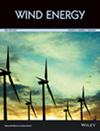Bayesian uncertainty quantification framework for wake model calibration and validation with historical wind farm power data
IF 3.3
3区 工程技术
Q3 ENERGY & FUELS
引用次数: 3
Abstract
The expected growth in wind energy capacity requires efficient and accurate models for wind farm layout optimization, control, and annual energy predictions. Although analytical wake models are widely used for these applications, several model components must be better understood to improve their accuracy. To this end, we propose a Bayesian uncertainty quantification framework for physics-guided data-driven model enhancement. The framework incorporates turbulence-related aleatoric uncertainty in historical wind farm data, epistemic uncertainty in the empirical parameters, and systematic uncertainty due to unmodelled physics. We apply the framework to the wake expansion parameterization in the Gaussian wake model and employ historical power data of the Westermost Rough offshore wind farm. We find that the framework successfully distinguishes the three sources of uncertainty in the joint posterior distribution of the parameters. On the one hand, the framework allows for wake model calibration by selecting the maximum a posteriori estimators for the empirical parameters. On the other hand, it facilitates model validation by separating the measurement error and the model error distribution. In addition, the model adequacy and the effect of unmodelled physics are assessable via the posterior parameter uncertainty and correlations. Consequently, we believe that the Bayesian uncertainty quantification framework can be used to calibrate and validate existing and upcoming physics-guided models.基于历史风电场功率数据的尾流模型标定与验证的贝叶斯不确定性量化框架
风能容量的预期增长需要高效准确的风电场布局优化、控制和年度能源预测模型。虽然分析尾流模型广泛用于这些应用,但必须更好地理解几个模型组件以提高其准确性。为此,我们提出了一个贝叶斯不确定性量化框架,用于物理指导的数据驱动模型增强。该框架结合了历史风电场数据中与湍流相关的任意不确定性,经验参数中的认知不确定性,以及由于未建模物理而导致的系统不确定性。我们将该框架应用于高斯尾流模型的尾流扩展参数化,并采用了west most Rough海上风电场的历史功率数据。我们发现该框架成功地区分了参数联合后验分布中的三种不确定性来源。一方面,该框架允许通过选择经验参数的最大后验估计量来校准尾流模型。另一方面,通过分离测量误差和模型误差分布,便于模型验证。此外,模型的充分性和未建模物理的影响可通过后验参数不确定性和相关性来评估。因此,我们相信贝叶斯不确定性量化框架可以用来校准和验证现有的和即将到来的物理指导模型。
本文章由计算机程序翻译,如有差异,请以英文原文为准。
求助全文
约1分钟内获得全文
求助全文
来源期刊

Wind Energy
工程技术-工程:机械
CiteScore
9.60
自引率
7.30%
发文量
0
审稿时长
6 months
期刊介绍:
Wind Energy offers a major forum for the reporting of advances in this rapidly developing technology with the goal of realising the world-wide potential to harness clean energy from land-based and offshore wind. The journal aims to reach all those with an interest in this field from academic research, industrial development through to applications, including individual wind turbines and components, wind farms and integration of wind power plants. Contributions across the spectrum of scientific and engineering disciplines concerned with the advancement of wind power capture, conversion, integration and utilisation technologies are essential features of the journal.
 求助内容:
求助内容: 应助结果提醒方式:
应助结果提醒方式:


